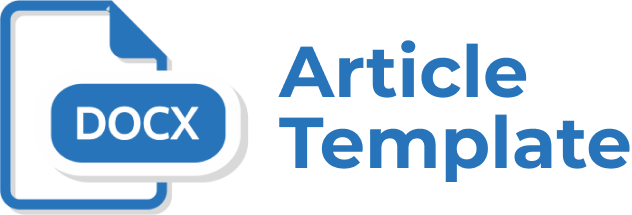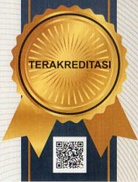Work-Life Balance, Take Home Pay and Workplace Environment: Which One has the Most Influence toward Employee Performance on Gen Z?
Abstract
Keywords
Full Text:
PDFReferences
Acemoglu, D., & Restrepo, P. (2018). The Race between Man and Machine: Implications of Technology for Growth, Factor Shares, and Employment. American Economic Review, 108(6), 1488–1542. https://doi.org/10.1257/aer.20160696
Agarwal, H., & Vaghela, P. S. (2018). Work Values of Gen Z: Bridging the Gap to the Next Generation. National COnference on Innovative Business Management Practices in 21st Century, December, 1–26.
Aggarwal, R. (1999). Technology and Globalization as Mutual Reinforces in Business: Reorienting Strategic Thinking for the New Millenium. Management International Review, January 1999, 83–104. https://doi.org/10.1007/978-3-322-90991-6
Ahmad, B., & Khan, F. A. (2018). Influence of Work Environment on Employee Performance: A Critical Review. The Business Review, 22(2), 53–62.
Ahyar, H. (2020). Buku Metode Penelitian Kualitatif dan Kuantitatif. CV Pustaka Ilmu Group.
Al-omari, K., & Okasheh, H. (2017). The Influence of Work Environment on Job Performance: A Case Study of Engineering Company in Jordan. International Journal of Applied Engineering Research, 12(24), 15544–15550.
Ansari, S., Chimani, K., Baloch, R. A., & Bukhari, S. F. H. (2015). Impact of Work Life Balance on Employee Productivity: An Empirical Investigation from the Banking Sector of Pakistan. Information and Knowledge Management, 5(10), 52–60.
Beckers, D. G. J., Linden, D. van der., Smulders, P. G. W., Kompier, M. A. J., Veldhoven, M. J. P. M. V., & Yperen, N. W. V. (2004). Working Overtime Hours: Relations with Fatigue, Work Motivation, and the Quality of Work. Journal of Occupational and Environmental Medicine, 46(12), 1282–1289. https://doi.org/10.1097/01.jom.0000147210.95602.50
Beham, B., & Drobnič, S. (2010). Satisfaction with Work-Family Balance Among German office Workers. Journal of Managerial Psychology, 25(6), 669–689. https://doi.org/10.1108/02683941011056987
Benítez-Márquez, M. D., Sánchez-Teba, E. M., Bermúdez-González, G., & Núñez-Rydman, E. S. (2022). Generation Z Within the Workforce and in the Workplace: A Bibliometric Analysis. Frontiers in Psychology, 12(February), 1–16. https://doi.org/10.3389/fpsyg.2021.736820
Bjärntoft, S., Hallman, D. M., Mathiassen, S. E., Larsson, J., & Jahncke, H. (2020). Occupational and Individual Determinants of Work-Life Balance among Office Workers with Flexible Work Arrangements. International Journal of Environmental Research and Public Health, 17(4), 1–15. https://doi.org/10.3390/ijerph17041418
Blanka, C., Krumay, B., & Rueckel, D. (2022). The Interplay of Digital Transformation and Employee Competency: A Design Science Approach. Technological Forecasting and Social Change, 178(February), 121575. https://doi.org/10.1016/j.techfore.2022.121575
Calvin, O. Y. (2017). The Impact of Remuneration on Employees’ Performance: A Study of Abdul Gusau Polytechnic, Talata-Mafara and State College of Education Maru, Zamfara State. Nigerian Chapter of Arabian Journal of Business and Management Review, 4(2), 34–43. https://doi.org/10.12816/0037554
Dolot, A. (2018). The Characteristics of Generation Z. E-Mentor, 74, 44–50. https://doi.org/10.15219/em74.1351
Dwidienawati, D., & Gandasari, D. (2018). Understanding Indonesia’s Generation Z. International Journal of Engineering and Technology(UAE), 7(3), 250–252. https://doi.org/10.14419/ijet.v7i3.25.17556
Elayan, M. B. (2022). The New World of Work and Digital Learning: Millennials and Generation Z. Webology, 19(2), 4593–4603.
Ensari, M. S. (2017). A Study on the Differences of Entrepreneurship Potential Among Generations. Research Journal of Business and Management, 4(1), 52–62. https://doi.org/10.17261/Pressacademia.2017.370
Gunawan, H., & Amalia, R. (2015). Wages and Employees Performance: The Quality of Work Life as Moderator. International Journal of Economics and Financial Issues, 5, 349–353.
Haeruddin, M. I. M., Akbar, A., Dipoatmodjo, T. S. P., Kurniawan, W., & Abadi, R. R. (2022). The Toxicity of our City: The Effect of Toxic Workplace Environment on Employee’s Performance. International Journal of Social Science and Business, 6(2), 183–190. https://doi.org/10.23887/ijssb.v6i2.45297
Hafeez, I., Yingjun, Z., Hafeez, S., Mansoor, R., & Rehman, K. U. (2019). Impact of Workplace Environment on Employee Performance: Mediating Role of Employee Health. Business, Management and Education, 17(2), 173–193. https://doi.org/10.3846/bme.2019.10379
Halinski, M., & Duxbury, L. (2019). Workplace Flexibility and Its Relationship with Work-Interferes-with-Family. Personnel Review, 49(1), 149–166. https://doi.org/10.1108/PR-01-2019-0048
Hayman, J. R. (2009). Flexible Work Arrangements: Exploring the Linkages between Perceived Usability of Flexible Work Schedules and Work/Life Balance. Community, Work and Family, 12(3), 327–338. https://doi.org/10.1080/13668800902966331
Hofäcker, D., & König, S. (2013). Flexibility and Work-Life Conflict in Times of Crisis: A Gender Perspective. International Journal of Sociology and Social Policy, 33(9–10), 613–635. https://doi.org/10.1108/IJSSP-04-2013-0042
Holden, S., & Sunindijo, R. Y. (2018). Technology, Long Work Hours, and Stress Worsen Work-Life Balance in the Construction Industry. International Journal of Integrated Engineering, 10(2), 13–18. https://doi.org/10.30880/ijie.2018.10.02.003
Hsu, Y. Y., Bai, C. H., Yang, C. M., Huang, Y. C., Lin, T. T., & Lin, C. H. (2019). Long Hours’ Effects on Work-Life Balance and Satisfaction. BioMed Research International, 2019, 1–8. https://doi.org/10.1155/2019/5046934
Hussain, S. T., Lei, S., Akram, T., Haider, M. J., Hussain, S. H., & Ali, M. (2018). Kurt Lewin’s Change Model: A Critical Review of the Role of Leadership and Employee Involvement in Organizational Change. Journal of Innovation and Knowledge, 3(3), 123–127. https://doi.org/10.1016/j.jik.2016.07.002
Jackson, L. T. B., & Fransman, E. I. (2018). Flexi Work, Financial Well-Being, Work–Life Balance and Their Effects on Subjective Experiences of Productivity and Job Satisfaction of Females in an Institution of Higher Learning. South African Journal of Economic and Management Sciences, 21(1), 1–13. https://doi.org/10.4102/sajems.v21i1.1487
Katerina, R., & Aneta, R. (2014). The Impact of Globalization on the Business. Economic Analysis, 47(3–4), 83–89. https://doi.org/10.17759/langt.2017040412
Kerdpitak, C., & Jermsittiparsert, K. (2020). The Effects of Workplace Stress, Work-Life Balance on Turnover Intention: An Empirical Evidence from Pharmaceutical Industry in Thailand. Systematic Reviews in Pharmacy, 11(2), 586–594. https://doi.org/10.5530/srp.2020.2.86
Kim, H. K. (2014). Work-Life Balance and Employees’ Performance: The Mediating Role of Affective Commitment. An International Journal, 6(1), 37–51.
Kupczyk, T., Rupa, P., Gross-Golacka, E., Urbanska, K., & Parkitna, A. (2021). Expectations and Requirements of Generation Z towards Salary. European Research Studies Journal, 24(4), 85–96. https://doi.org/10.35808/ersj/2564
Lazǎr, I., Osoian, C., & Raţiu, P. (2010). The Role of Work-Life Balance Practices in Order to Improve Organizational Performance. European Research Studies Journal, 13(1), 201–213. https://doi.org/10.35808/ersj/267
Ldama, J., & Nasiru, M. (2020). Salary Increase and its Impact on Employee Performance in Adamawa State University, Mubi. International Journal for Innovative Reseach in Multidisciplinary Field, 6(8), 47–57.
Marginean, A. E. (2021). Gen z Perceptions and Expectations upon Entering the Workforce. European Review of Applied Sociology, 14(22), 20–30. https://doi.org/10.1515/eras-2021-0003
Marques, V. C., & Berry, G. R. (2021). Enhancing Work-Life Balance Using a Resilience Framework. Business and Society Review, 126(3), 263–281. https://doi.org/10.1111/basr.12237
Melayansari, M., & Bhinekawati, R. (2020). The Impact of Work-Balance on Employee Performance Mediated by Employee Loyalty (Lessons from Female Employees Working in International Environment in Greater Jakarta, Indonesia). Advances in Economics, Business and Management Research, 132(AICMaR 2019), 113–118. https://doi.org/10.2991/aebmr.k.200331.025
Ngoc, T. N., Dung, M. V., Rowley, C., & Bach, M. P. (2022). Generation Z Job Seekers’ Expectations and Their Job Pursuit Intention: Evidence from Transition and Emerging Economy. International Journal of Engineering Business Management, 14, 1–13. https://doi.org/10.1177/18479790221112548
Ngozi, O. A., & Chinelo, U. (2020). Effect of Work Life Balance and Employee Productivity in Nigerian Organizations. International Journal of Advanced Research, 9(2), 67–93. www.garph.co.uk
Olusola, A. I., & Nathaniel, N. D. (2019). Dimensions of Pay Satisfaction as Predictors of Work Engagement among Military and Civilian Personnel. Journal of Reviews on Global Economics, 8, 1077–1085. https://doi.org/10.6000/1929-7092.2019.08.93
Patel, M., & Pillai, V. (2020). A Study on Impact of Environment on Employees Performance at JK Lakshmi Cement LTD. International Journal of Creative Research Thoughts (IJCRT), 8(4), 2175–2183.
Peiro, J., & Martinez-Tur, V. (2022). “Digitalized” Competencies: A Crucial Challenge beyond Digital Competences. Journal of Work and Organizational Psychology, 38(3), 189–199.
Samson, G. N., & Waiganjo, M. (2015). Effect of Workplace Environment on the Performance of Commercial Banks Employees in Nakuru Town. International Journal of Managerial Studies and Research, 3(12), 76–89.
Sánchez-Hernández, M. I., González-López, Ó. R., Buenadicha-Mateos, M., & Tato-Jiménez, J. L. (2019). Work-life Balance in Great Companies and Pending Issues for Engaging New Generations at Work. International Journal of Environmental Research and Public Health, 16(24), 1–18. https://doi.org/10.3390/ijerph16245122
Sarode, A. P., & Shirsath, M. (2014). The Factors Affecting Employee Work Environment & It’s Relation with Employee Productivity. International Journal of Science and Research (IJSR), 3(11), 2735–2737.
Schroth, H. (2019). Are You Ready for Gen Z in the Workplace? California Management Review, 61(3), 5–18. https://doi.org/10.1177/0008125619841006
Seniwoliba, J. A. (2015). Equitable Pay as an Antecedent of Work Performance and Job Satisfaction: Experience from University for Development Studies. International Journal of Advanced Scientific Research & Development (IJASRD), 2(4), 57–83.
Shaari, R., Sarip, A., Abdul Wahab, S. R., & Md Saat, S. N. A. (2022). Work-Life Balance and Employee Performance in Selected Manufacturing Company. International Journal of Academic Research in Business and Social Sciences, 12(9), 1726–1734. https://doi.org/10.6007/ijarbss/v12-i9/14727
Singh, A. P., & Dangmei, J. (2016). Understanding the Generation Z: The Future Workforce. South-Asian Journal of Multidisciplinary Studies, 3(3), 1–5.
Soelistya, D., Wijayanti, T. C., & Sukaris. (2022). The Mediating Role of the Work Environment Between Work Life Balance and Work Supervision in Improving Employee Performance. Journal of Positive School Psychology, 6(5), 2402–2417.
Sugiyono. (2016). Metode Penelitian Pendidikan Pendekatan Kuantitatif, Kualitatif, dan R&D. Cetakan 24. Bandung: Alfabeta.
Susanto, P., Hoque, M. E., Jannat, T., Emely, B., Zona, M. A., & Islam, M. A. (2022). Work-Life Balance, Job Satisfaction, and Job Performance of SMEs Employees: The Moderating Role of Family-Supportive Supervisor Behaviors. Frontiers in Psychology, 13(June), 1–12. https://doi.org/10.3389/fpsyg.2022.906876
Umar, A. (2014). Effect of Wages, Motivation, and Job Satisfaction on the Performance of Workers in the Manufacturing Industry in the City of Makassar. European Journal of Business and Management, 6(5), 85–96.
Victoria, A., Olive, E., Babatunde, A., & Nanle, M. (2019). Work-Life Balance and Employee Performance: A Study of Selected Deposit Money Banks in Lagos State, Nigeria. The Journal of Social Sciences Research, 5(12), 1787–1795. https://doi.org/10.32861/jssr.512.1787.1795
Wilfred, O. N., Elijah, C. M., & Muturi, W. (2014). Effect of Remuneration on Employees Performance in the Ministry of Internal Security: A Case of Kisii County. International Journal of Human Resource Studies, 4(1), 223. https://doi.org/10.5296/ijhrs.v4i1.5478
Wong, K., Chan, A. H. S., & Ngan, S. C. (2019). The Effect of Long Working Hours and Overtime on Occupational Health: A Meta-Analysis of Evidence from 1998 to 2018. International Journal of Environmental Research and Public Health, 16(12), 13–19. https://doi.org/10.3390/ijerph16122102
Zhenjing, G., Chupradit, S., Ku, K. Y., Nassani, A. A., & Haffar, M. (2022). Impact of Employees’ Workplace Environment on Employees’ Performance: A Multi-Mediation Model. Frontiers in Public Health, 10(May), 1–13. https://doi.org/10.3389/fpubh.2022.890400
DOI: https://doi.org/10.32487/jshp.v8i1.1810
Refbacks
JSHP: Jurnal Sosial Humaniora dan Pendidikan
is licensed under a Creative Commons Attribution-ShareAlike 4.0 International License (CC BY-SA 4.0)





